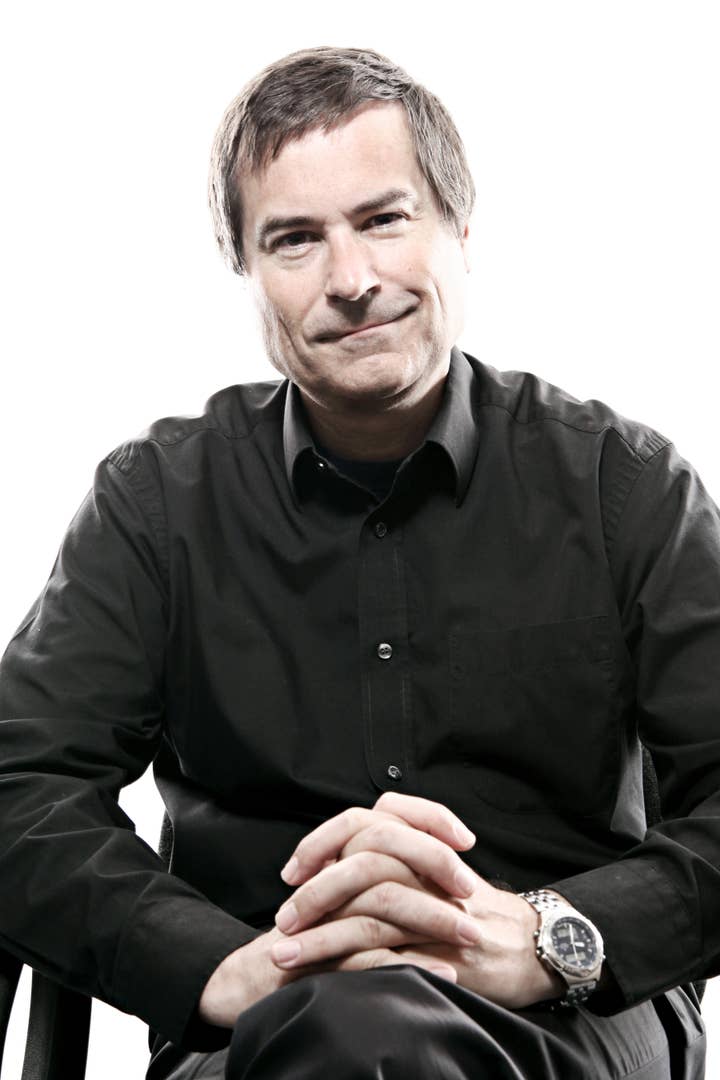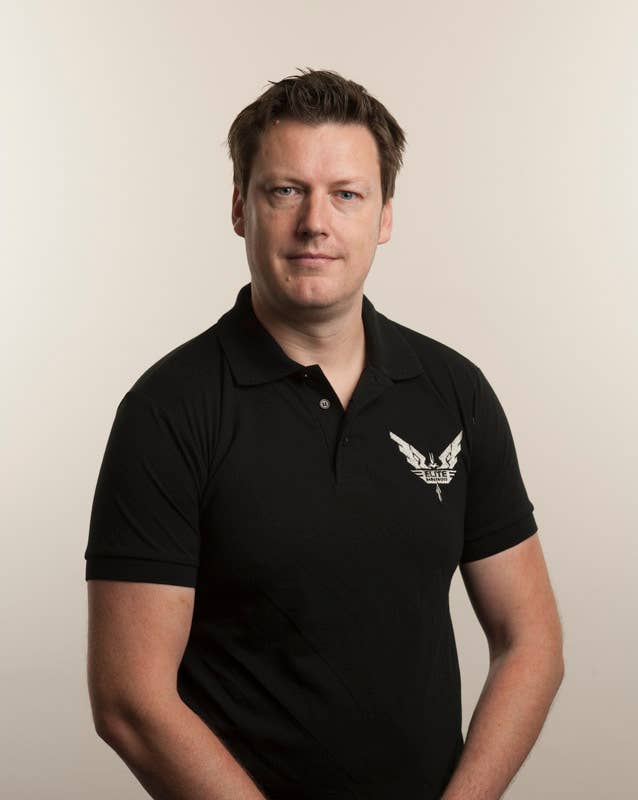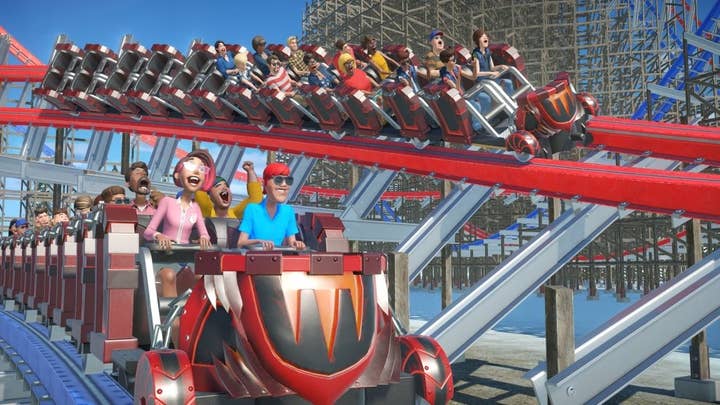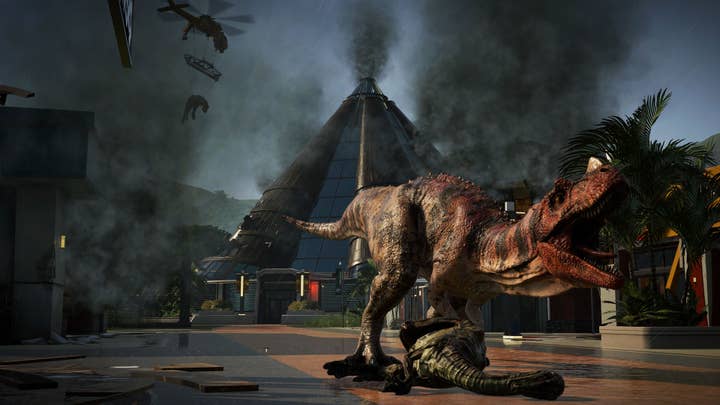Frontier: “We want to become a third-party publisher”
CEO David Braben and CCO Jonny Watts on publishing, Tencent and the return of the British games industry
We made a slightly shameful discovery ahead of our visit to Frontier's shiny new Cambridge HQ.
It turned out we've not spoken to the company - not in any official capacity - for four years. We would like to say Frontier has been busy keeping its head down, but we know that's not true. In those intervening four years, Frontier has released Elite: Dangerous (2.75 million sales as of August 2017), Planet Coaster (1 million) and now Jurassic World Evolution. It's abandoned work-for-hire and launched a self-publishing division, held its own fan expo and has even attracted significant investment from games giant Tencent.
All while becoming the biggest video game company (in terms of market value) in the UK.
So our visit to Frontier's immaculate new office to meet with CEO David Braben and CCO Jonny Watts was, it's fair to say, long overdue.
"We used to have three separate buildings on the Cambridge Science Park," Braben reminds us as we arrive. "Which was a bit of a pain when it's raining, and you end up with people feeling separate. So it's wonderful to be in one big building. In the early days, we started out in a farmhouse just outside of Cambridge and we also had an office in Ely. You end up with people not working as efficiently as they can in the same building. Here people can move between teams, and it's easier to walk down the corridor and just ask a question."

The new office is a physical manifestation of a significantly successful five years for Frontier. The developer isn't new to publishing its own games (remember LostWinds on Nintendo Wii?), but following its floatation and the success of Elite Dangerous, the company decided, after 20 years, to end its work-for-hire business and go it alone. It completed its contract with Microsoft (which included the 2015 game Screamride and incubation work on HoloLens), built its own publishing team and now answers only to itself and its shareholders.
"We learnt a lot by working with publishers like Microsoft," Watts tells us. "We now have a publishing department, and there is a really lovely relationship between development and publishing. We understand publishing requests a lot more now, because we can just walk over to them and they'll give me the insight as to why we have to do this, and vice versa. That relationship has been getting better and better. I don't think we're experts. But we're pretty good."
Braben adds: "There is a lot of development involvement in publishing, even when you're not the publisher. So we got sight of it before we made this move. A lot of those earlier games we made for other people, there were a large number of publishing meetings we were part of that the publisher didn't even come to, because a lot of the functions were outsourced. When you go to those marketing and PR agencies, you realise that there is no difference if we were to go direct, or have the function ourselves.
"Now we've moved to this [publishing] side of the table, we know the horrors of the other side, so we can make that process better."
David Braben, Frontier
"I've been in the business now for 36 years. We've seen lots of companies come and go. One of the biggest risks for us, in hindsight, was publishers going down. That was a big issue. But you don't half learn a lot about the process going through that."
Frontier handles PR, marketing, sales and community in-house, and other studios that boast similar departments (including Cambridge Science Park neighbours Jagex) have been offering these services out to external studios. So could Frontier do the same and join the world of third-party publishing?
"Yes," says Braben, clearly anticipating the question. "There is an element of watch this space... but it is one of the things we're looking at. Our business has done pretty well and what we're doing is quite cash generative. So there is an opportunity. Now we've moved to this side of the table, we know the horrors of the other side, so we can make that process better."
In terms of how many games it wants to publish and when, Braben and Watts don't have the answers yet. But the games do need to fit with Frontier's identity.

"It has to speak to our values," Watts says. "The games that we make, we want them to be remembered. I am hoping Elite Dangerous will be remembered for a very long time. Rollercoaster Tycoon is still being played today."
Braben continues: "It was still No.1 in the budget chart roughly ten years after it came out. I got a lot of criticism, we both did - from Atari and others - because when we first brought out the game, the detail sliders we had went all the way to requiring Pixel Shaders, so we could do shiny water and things like that. But it got us the covers of the magazines. And the fact that you needed quite an expensive machine to be able to do that didn't really matter. The game still ran on lower computers.
"Yet it meant the game had become future proofed. It continued to sell when Pixel Shaders began to occur.
"It's that sort of philosophy... I was asked on Elite Dangerous if we were supporting HD - which meant 1080p, which today you would be mad not to. I said: 'Yes, and we're also supporting 4K, 8K and 16K.' There was a bit of a aghast look that we were even supporting 4K. Now, a 4K screen is sub-$200."
Back to Watts: "Frontier games are always ambitious, always slightly sophisticated and trying to hit the high notes, and doing things that haven't been done before."

The other key element is authenticity. Frontier is proud of the realistic physics work that exists in Planet Coaster, where the game models all the various support structures that are needed to make players' rollercoasters a reality.
This extends to its other games. During last year's Frontier Expo event, it invited Jack Horner - the palaeontologist who inspired the Sam Neill character in Jurassic Park - to discuss making dinosaurs out of chickens. The event also featured astrobiologist William Bains to discuss plausible biologies on other planets. They're topics that fascinate the Frontier teams as they look to build their games.
Scientists regularly visit the studio to discuss new features in titles like Elite, while the new Jurassic World game features the cast of the movie (including Jeff Goldblum) and hundreds of easter eggs related to the movie.
Watts believes that this attention to detail has given Frontier's titles a unique quality, and it's starting to find that it has fans of not just Elite or Planet Coaster, but of all of its games.
"Before, it was never a Frontier game. It was a Microsoft game, or Sony, or Atari, or LucasArts. Now, with our last three games all branded as Frontier, we're seeing the crossing of fans"
Jonny Watts, Frontier
"That's happening a lot. I remember recognising a name on our Planet Coaster forums, and I was like: 'Hmmm. I thought you were from Elite Dangerous'. But it turns out they're a fan of both," Braben says.
Watts adds: "It's interesting. Before, it was never a Frontier game. It was a Microsoft game, or Sony, or Atari, or LucasArts. At our event we had a museum featuring all of our games going all the way back to Elite. All playable. We had Zarch on an Archimedes monitor. It was awesome. And people would say: 'I didn't realise you made that one?' 'Dog's Life was one of my favourite games growing up'. So now, with our last three games all branded as Frontier, we're seeing the crossing of fans."
And there's going to be plenty more Frontier-branded games to look forward to. The studio embraces the games-as-a-service model, with teams still working on all of its self-published titles, but it's not slowing down the creation of new projects. There was two years between Elite Dangerous and Planet Coaster, 18 months between Planet Coaster and Jurassic World Evolution, and Braben expects the gap will get smaller still. There are two new games (we weren't allowed to see) in active development, and with the prospect of publishing, we should expect to see a lot more from the company.

Watts insists Frontier is expanding "thoughtfully", but it has the capital in place to grow faster if needed. The firm's latest financial boost came when Chinese giant Tencent acquired 9% of the company, and Braben insists that its involvement has been nothing but positive.
"They're really supportive and haven't interfered in any way," he says. "Seeing the world from the Chinese perspective is very interesting. China is, or is about to become, the world's biggest territory for games. It has grown at such a rate. And I don't just mean mobile, but PC, too. But they're such a selective audience. There is a danger that the West sees China... or doesn't see it for the discerning market that it is. Tencent really helps with the position in China."
Watts adds: "And also through the injection of cash. That is the facilitator, as well, for making great, great games. We can invest more in our teams, and it will also facilitate publishing games from other people."
"There were a lot of great success stories in the UK, which then disappeared. What we're seeing now is that process has been arrested"
David Braben, Frontier
Braben and Watts jokingly describe Frontier as a "30 year overnight success story", and you can see what they mean. But they're not the only one. Team17, Codemasters, Sumo... there are numerous long-standing British game makers who, after years of ups and downs, have found themselves going public and enjoying strong growth.
After a tough few decades, it feels as if the UK games industry has turned a corner.
"In the 1990s, there were a lot of great British companies," Braben explains. "And one-by-one they were getting acquired, mostly by US companies. Then, depressingly, they slowly suffocated. Or that is how it felt. Their founders were relocated to head office, the company would lose its identity, the IP would end up getting made elsewhere, and the company would be closed. There were a lot of great success stories in the UK, which then disappeared. What we're seeing now is that process has been arrested."
He concludes: "One of the problems in the UK that caused a lot of damage was there were a lot of unsuccessful IPOs in the 1990s. If you look at Eidos, Argonaut... the City still remembers it. It's astonishing. And it has taken a while to get beyond that. I think it's one of the things that Frontier has done for the industry is show that you can be very successful as a games company. If you look at games companies in the US, they've been massively successful over the same period. It's just we had a few examples of companies that didn't necessarily perform very well - without casting aspersions.
"I just hope that we can consistently go forward, and that other companies take it very seriously. We have to plan and do well. There is a huge responsibility."








